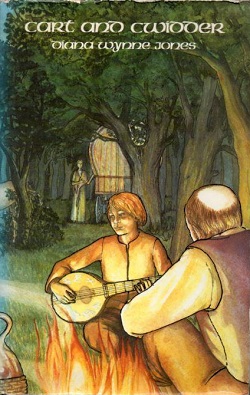This is one of the ones that I had no warning of before it came on the scene. I found it, believe it or not, while browsing Common Sense Media. Not, perhaps, the most common way of discovering books... but it worked the trick this time.
At the beginning of the book:
The kingdom of Lumatere was once a beautiful, prosperous land. But after a merciless coup and five days of civil war, one of the powerful Forest Dwellers {not elves - don't worry} curses the kingdom as she is dying. Impassable barriers of black mist rise to cut off Lumatere from the surrounding countries, trapping the people inside with the terrifying new king - and the refugees outside, with no chance of returning to their homes and families.
This book is the story of Finnikin, a nineteen-year-old boy who has spent the last ten years trying to find Balthazar, his childhood friend and the heir of the kingdom. When he makes a journey to meet a girl who claims to have dreamed of Balthazar, he finds strange new possibilities - and more hope than he's had for a decade.
Maybe the Lumaterans
can return to their long-lost homes.
Writing: It doesn't get much better than this, frankly. Several scenes stand out even more brightly {I'm thinking of Evanjalin and Finnikin atop the cliff, shouting names into the valley; the sequence at the crossroads; and the entire last chapter}. Ms. Marchetta knows how to turn a word and a phrase, and her names are generally top-notch as well.
The plot is never confusing, though "packed" might be a good description. More happens in this one book, I think, than in a few trilogies out there. And there are surprises, which is why I left off early in the plot description {that and I'm bad at summaries}.
And as for the girls, this book has one of the strongest female characters that I've met since... Katniss. {All right, now I'm imagining Evanjalin and Katniss having an argument... I think I would leave the room if they did, for it would get very interesting very fast.}
Some quotes -
"Stand back, Evanjalin. You'll get hurt!"
"How long is this going to take, Finnikin? Ask them if they have food. You promised me roast pork."
Finnikin rolled his eyes as Moss swung from side to side, trying to dislodge him from his back. "Woman, I'm trying to fight here! Or has that escaped your attention?"
----
They traveled for what seemed hours and Froi truly thought it was night because it was so thick with trees and no light crept in. But then he saw the shine in the distance and the forest turned into a meadow, that was the word Sir Topher used, and the meadow had the tallest grass with so many yellow flowers that it hurt Froi's eyes to look at. But he didn't look away because it was a different kind of hurt, one he hadn't felt before and he found himself walking through the long grass and yellow flowers just to see what they felt like against his skin.
----
This book is definitely for the older teens - and the adults. I can't think of any reason an adult wouldn't like it. There's some content that makes me say fifteen-and-up readers, though that's not a hard-and-fast rule. {Mostly nothing described, but a number of references.}
Violence... yes. A lot. Not described lengthily, but described competently and clearly. The other reason this isn't for the young.
Morally, it's hard to tell whether the author condones the more questionable behavior in the book. I feel that she does not, especially the violence.
There are strong themes of hope, responsibility, mercy, and patriotism - with hope predominating. A good read for anyone mature enough. Check it out from the library first, as it might not be to everyone's taste... but the hardback cover is a work of art, if you decide to buy a copy later.
"Be prepared for the worst, my love, for it lives next door to the best."
-one
Finnikin character quotes her father's favorite saying
